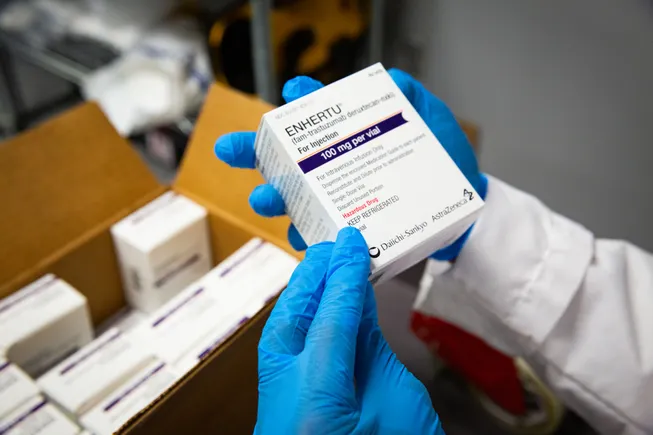Antibody-drug conjugates (ADCs) were the highlight of this year’s annual meeting of the American Society of Clinical Oncology, sparking excitement in the industry for their potential in cancer care. The concept of using a cancer-killing drug with an antibody targeting specific tumors has evolved significantly since the first FDA-approved ADC, Mylotarg, faced challenges due to liver toxicity. Now, researchers have made strides in developing 15 different ADC molecules, with new approaches like AbbVie’s Emrelis targeting specific biomarkers in cancer.
Flagship ADCs like Daiichi Sankyo and AstraZeneca’s Enhertu have shown significant success in treating breast, gastric, and lung cancers, paving the way for earlier lines of therapy and the development of next-generation targeted cancer medicines. Despite initial safety challenges, advancements in engineering ADCs have improved their cancer-killing effectiveness while minimizing side effects.
Enhertu, in particular, has emerged as a leader in the ADC space, with high forecasted revenues and breakthroughs in breast cancer treatment. The ability to rechallenge a target with ADCs without encountering resistance is a compelling aspect of these therapies, allowing for potential treatment combinations to enhance patient outcomes.
At this year’s ASCO meeting, discussions focused on Enhertu’s success in earlier stages of care, with studies showing its superiority over chemotherapy as a first-line treatment. Daiichi Sankyo is now seeking approvals for Enhertu in earlier disease positions, highlighting the evolving story of this groundbreaking ADC.
As the field of oncology continues to advance, collaborations between ADCs and other cancer treatments, such as immuno-oncology drugs, are expected to yield the best outcomes for patients. Pfizer, one of the key players in the ADC space, showcased a significant presence at this year’s ASCO meeting, reflecting the growing interest and investment in ADC research and development.
Overall, the progress in ADCs and their potential in cancer care have garnered significant attention and excitement within the industry, signaling a promising future for these innovative therapies.
The field of antibody-drug conjugates (ADCs) has been evolving rapidly, with a focus on developing more potent payloads for the next generation of therapies. While HER2 has been a longstanding target in oncology, companies like Pfizer are now exploring new avenues for ADC development.
Pfizer’s acquisition of Seagen, a pioneer in ADC technology, in 2023 reflects the company’s commitment to advancing ADCs targeting the PD-(L)1 pathway. Checkpoint inhibitors like Keytruda and Opdivo have demonstrated the potential of blocking this pathway in immuno-oncology, and Pfizer is looking to leverage this mechanism in their ADCs.
In addition to targeting the PD-(L)1 pathway, Pfizer has also partnered with Summit Therapeutics to explore the combination of ADCs with bispecific antibodies in early-stage development. This innovative approach could open up new possibilities for treating cancer by simultaneously targeting multiple pathways.
Gilead’s Trodelvy has also shown promising results in a study involving first-line triple-negative breast cancer when combined with Keytruda. Offering a chemo-free treatment option for this patient population addresses a significant unmet need in oncology.
Despite the potential of ADCs and other emerging trends in oncology, entering this arena can be challenging for drugmakers. Making early investments in new modalities requires a leap of faith, as the true validation comes from clinical data. While licensing deals may signal industry trends, it is essential to prioritize data-driven decision-making to ensure long-term success.
As the field of ADCs continues to mature and novel targets emerge, the importance of validated data cannot be understated. While hurdles remain, the potential for ADCs to revolutionize cancer treatment is becoming increasingly clear. Stay tuned for exciting developments in this rapidly evolving field.


